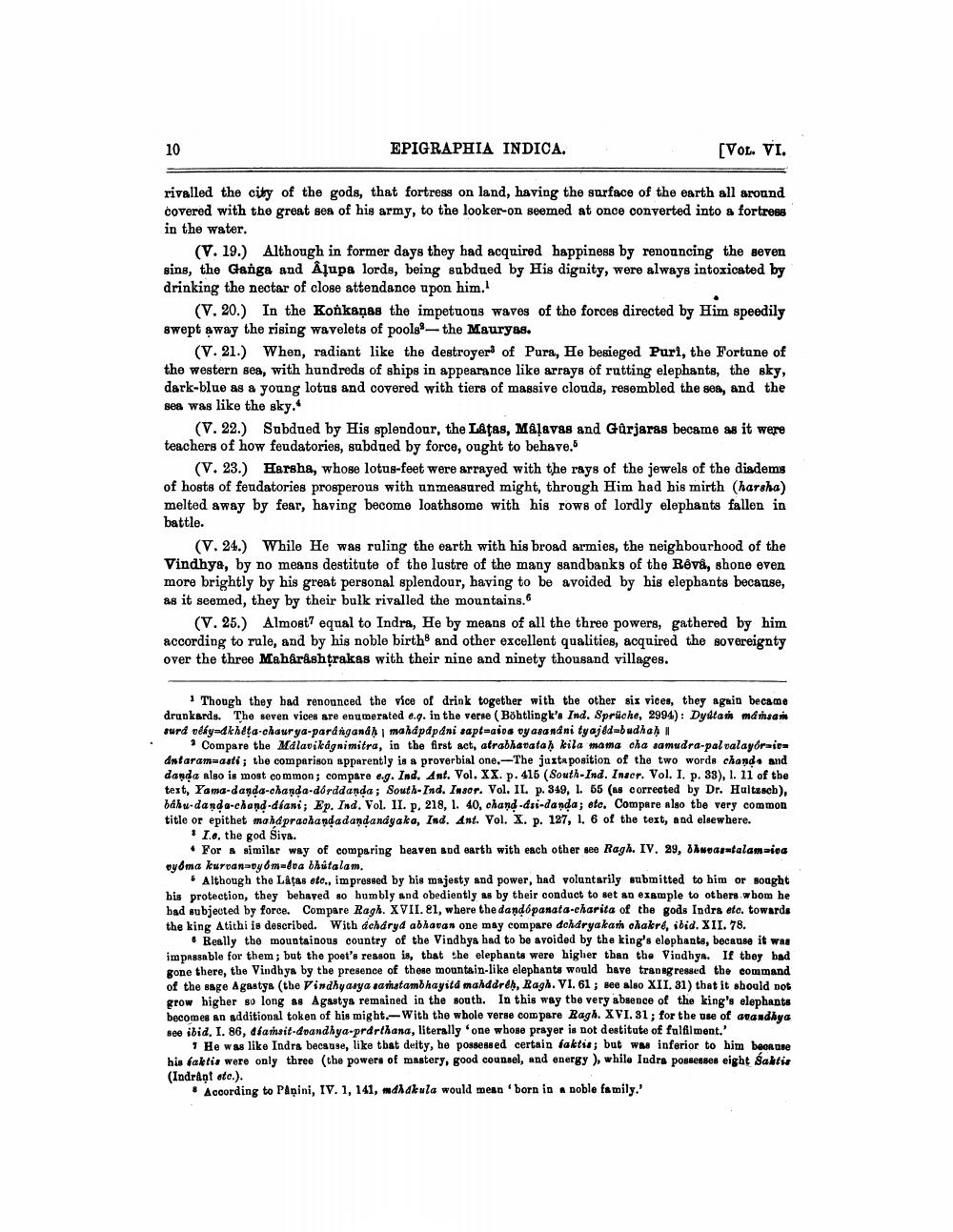________________
EPIGRAPHIA INDICA.
[VOL. VI.
rivalled the city of the gods, that fortress on land, having the surface of the earth all around covered with the great sea of his army, to the looker-on seemed at once converted into a fortress in the water.
(V. 19.) Although in former days they had acquired happiness by renouncing the seven sins, the Ganga and Åļupa lords, being subdued by His dignity, were always intoxicated by drinking the nectar of close attendance upon him.
(V. 20.) In the Konkaņas the impetuons waves of the forces directed by Him speedily swept away the rising wavelets of pools - the Mauryas.
(V. 21.) When, radiant like the destroyer of Pura, He besieged Puri, the Fortune of the western sea, with hundreds of ships in appearance like arrays of rutting elephants, the sky, dark-blue as a young lotus and covered with tiers of massive clouds, resembled the sea, and the sea was like the sky.
(V. 22.) Subdued by His splendour, the Låtas, MAļavas and Gurjaras became as it were teachers of how feudatories, subdued by force, ought to behave.
(V. 23.) Harsha, whose lotus-feet were arrayed with the rays of the jewels of the diadems of hosts of feudatories prosperous with unmeasured might, through Him had his mirth (harsha) melted away by fear, having become loathsome with his rows of lordly elephants fallen in battle.
(V. 24.) While He was ruling the earth with his broad armies, the neighbourhood of the Vindhye, by no means destitute of the lustre of the many sandbanks of the Rêvå, shone even more brightly by his great personal splendour, having to be avoided by his elephants because, as it seemed, they by their bulk rivalled the mountains.
(V. 25.) Almost? equal to Indra, He by means of all the three powers, gathered by him according to rule, and by his noble birth and other excellent qualities, acquired the sovereignty over the three Maharashtrakas with their nine and ninety thousand villages.
1 Though they had renounced the vice of drink together with the other sis vices, they again became drunkards. The seven vices are enumerated e.g. in the verse (Böhtlingk's Ind. Sprüche, 2994): Dylan mamsan surd vékyndkheta-chaurya-pardngandhi mahapdpdni sapt-aida oy asandni tyaj&d=budha) |
Compare the Malavikagnimitra, in the first act, atrabhavatakila mama cha samudra-pal valayorais dntaram=asti; the comparison apparently is a proverbial one.-The juxta position of the two words chand, and danda also is most common; compare e.g. Ind. Ant. Vol. XX. p. 415 (South-Ind. Inscr. Vol. I. p. 33), l. 11 of the text, Yama-danda-chanda-dörddanda; South-Ind. Insor. Vol. IL p. 349, 1. 65 (as corrected by Dr. Haltzacb), báku-danda-chand-dlani; Ep. Ind. Vol. II. p. 218, 1. 40, chand-dss-danda; etc. Compare also the very common title or epithet mahaprachandadandanayaka, Ind. Ant. Vol. X. p. 127, 1. 6 of the text, and elsewhere.
* I.e, the god Siva.
• For & similar way of comparing heaven and earth with each other see Ragh. IV. 29, Bhuvaratalamzina oyma kurvan-oy&m=doa bhitalam.
• Although the Latas eto, impressed by his majesty and power, had voluntarily submitted to him or sought bis protection, they behaved so humbly and obediently as by their conduct to set an example to others wbom he bad subjected by force. Compare Ragh. XVII. 81, where the dandópanata charita of the gods Indra eto. towards the king Atithi is described. With dcháryd abharan one may compare dohdryakan chakre, ibid. XII. 78.
Really the mountainous country of the Vindbya had to be avoided by the king's elephants, because it was impassable for them; but the poet's reason is, that the elephants were higher than the Vindhya. If they bad gone there, the Vindhya by the presence of these mountain-like elephants would have transgressed the command of the sage Agastya (tbo Vindhyanya sanatambhayitá mahddréh, Ragh. VI. 61; seo also XII. 31) that it sbould not grow higher so long as Agastys remained in the south. In this way the very absence of the king's elephants becomes an additional token of his might.-With the whole verse compare Ragh. XVI. 31; for the use of avandhya see ibid. I. 86, dlansit-dvandhya-prdrthana, literally 'one whose prayer is not destitute of fulfilment.'
He was like Indra because, like that deity, he possessed certain faktis; but was inferior to him because his faktie were only three (the powers of mastery, good counsel, and energy ), whilo Iudra possesses eight Sakti (Indrat etc.).
& According to Panini, IV. 1, 141, madkula would mean born in noble family.'




